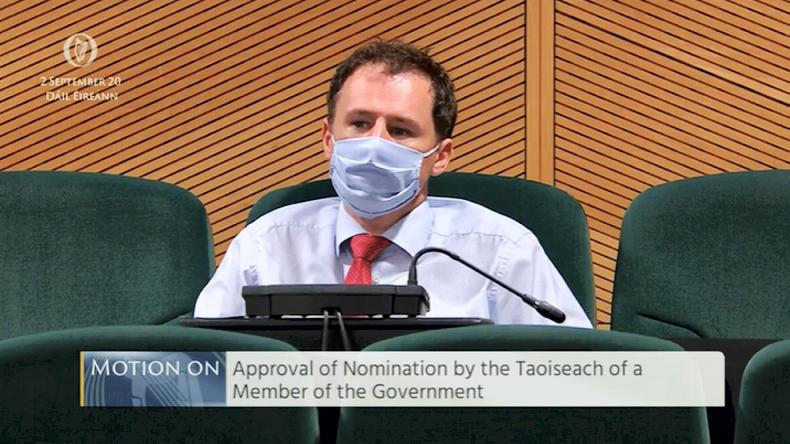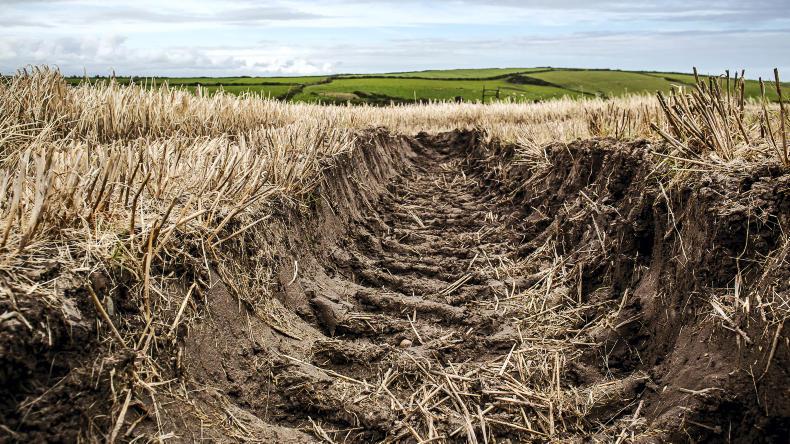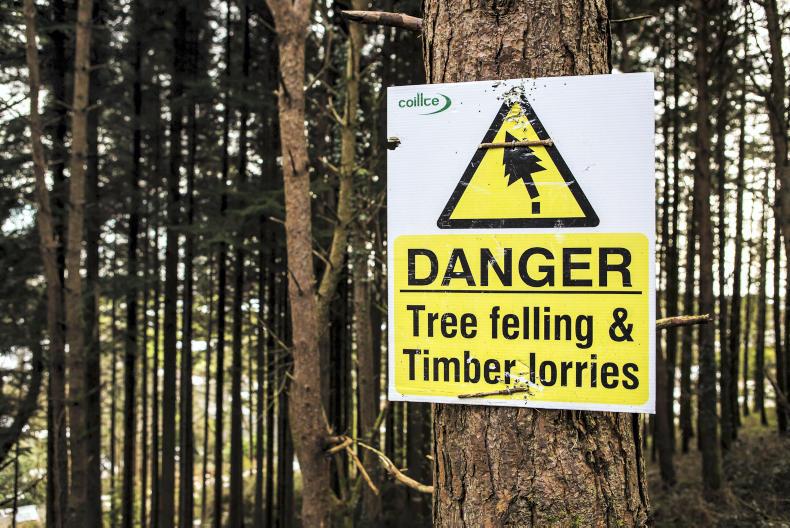We received an unprecedented response from readers to the resignation of Phil Hogan as European commissioner for trade. In selecting letters to print, we always try to give a range of viewpoints. However, in this instance, our readers’ views have been unanimous.
Despite acknowledging the commissioner’s wrongdoing, all express concern as to the impact his resignation will have on Ireland and the farming community. To accurately reflect the mood of farmers, we have published the letters we received.
Acutely aware as to the impact that decisions in Brussels can have on livelihoods, farmers recognise the need for strong political representation at EU and national level. In the rush by Government to force Hogan’s resignation, most believe that the voice of the farming community was not heard and the potential impact on their livelihoods given little regard.
The response to Hogan’s resignation shows the extent to which farmers believe the Government is failing them. The departure of two ministers for agriculture within the space just 60 days would be highly damaging to any government, but for it to be followed by a decision to force the resignation of an Irish commissioner from one of the most influential roles in Brussels, in the midst of CAP reform and as we hurtle towards a no-deal Brexit, either points to a government with poor judgement or one that has little regard or understanding of the challenges facing the agricultural sector.
But in as far as the past 60 days have been disastrous for the Government’s credibility, the extent to which it delivers for farmers and rural communities over the next 60 days will ultimately shape its fate.
Most believe the farming community was not heard and the potential impact on their livelihoods was given little regard
The appointment on Wednesday of Charlie McConalogue as Minister for Agriculture, Food and the Marine will be viewed as a step forward. He will bring energy and ambition to the role. In his time as Fianna Fáil spokesperson on agriculture, he showed an ability to understand the real issues affecting farmers on the ground – an important trait if the Government is to reconnect with the sector.

Minister for Agriculture Charlie McConalogue in the Dáil following his appointment to the role. \ Oireacthas TV
All attention is focused on Phil Hogan’s successor and the post they will be given. Worryingly, the scramble of recent days would suggest that no political groundwork was done by the Government to ensure the trade portfolio was retained prior to the move on Hogan.
Former taoiseach John Bruton paints a bleak picture on Brexit – one where, as the most exposed sector, Irish farmers could be hostages in bitter trade disputes between the UK and EU. Farmers will ultimately measure the immediate political fallout from his resignation on the EU’s continued commitment to protect Ireland, both politically and financially, from the impact of a no-deal Brexit. By involving the European Commission in a difficult domestic issue, the Government has interfered in the operation of the EU and is now responsible for any consequences that may arise – particularly in relation to Brexit and CAP. A bad outcome for Ireland on either front will see the Government’s decision to force Hogan’s resignation come back under the spotlight.
In an address to the IIEA on Wednesday, it was noticeable the extent to which the EU chief Brexit negotiator Michel Barnier emphasised the importance of weekly meetings with Phil Hogan in keeping the Irish voice centre stage in the negotiations with the UK.
At national level, the Government’s commitment to rebuilding credibility with farmers will be evident in October when details of Budget 2021 are announced. A commitment to maximise the national contribution in the CAP Rural Development Plan, where there is now scope to cofinance Pillar 2 schemes up to 57%, will be an important measure – as will a commitment to provide additional funding over and above the national cofinancing commitment for the new REPS detailed in the Programme for Government.
Along with a number of asks, including the introduction of a suckler cow and sheep welfare scheme, the IFA in its pre-budget submission has also highlighted the importance of ensuring taxation measures that support growth and restructuring are maintained and enhanced.
The Government has gotten off to a very rocky start – some of it bad luck and some of it totally its own doing. Farmers need a stable Government –but they also need a Government that demonstrates a solid commitment to the sector and an understanding of the challenges it faces.
So far this Government has failed on all fronts. Its performance and delivery over the next 60 days will be critical in determining if it can rebuild credibility and gain the support of farmers.

\ Jim Cogan
Tillage: tough finish to what has been a tough year
The past few days have seen a huge amount of harvest work up and down the country. The few fine days were very welcome to help get ground and crops dry and get combines and balers working again. But the preceding weeks had taken their toll and storms and high rainfall caused over 50% yield loss in some fields in parts of the country, with the south being worst affected.

Recent heavy rains has badly affected the spring barley harvest for farmers around the country.
This will go down as an extremely difficult year for tillage farmers. The significant difficulties in getting crops planted last autumn, subsequent winter damage, a late spring followed by drought, secondary growth in crops, rejection for malting and now poor harvest weather all lead to considerable harvest losses and high levels of frustration.
Staying with tillage, last week saw the launch of a report on Crops 2030 from the Tillage Stakeholder Consultative Group within Teagasc, comprising of representatives from across the industry.
The report provides a snapshot of the state of the sector in recent years and provides a range of actions and recommendations to guide future research and policy development.
Following this very difficult year, actions that might help with climate stability, soil characteristics and crop durability will receive greater focus.
REPS: farmers in the west waiting with interest
Also this week, Darren Carty and Barry Cassidy begin a four-part series looking at how the “new REPS” promised in the Programme for Government will need to be structured and funded if it is to live up to the legacy of the past.
Peaking at just over €300m in 2009, REPS was a critical part of farm income over its 20-year lifespan – accounting for 50-60% of total income on suckler and sheep farms in some years.
Its impact on smaller farms along the western seaboard was also over-pronounced with farmers in counties Galway and Mayo typically securing around 20% of the total expenditure.
The financial support to farmers in Leitrim each year was typically twice that received by farmers in Kilkenny. Therefore, when the scheme was replaced by much less financially attractive AEOS and GLAS schemes from 2011 onwards, smaller farms on marginal land and operating low-income enterprises were hit hardest financially. In part, this certainly helped fuel the farmer anger that we saw spill on to the gates of meat factories last summer. The extent to which this can be addressed by the Government’s new REPS scheme will largely be determined by the way in which the scheme is structured and the commitment to funding. Farmers will be watching and waiting with interest.
Forestry: licensing needs to change to protect Irish jobs and forests

The Government announcement “to align the forestry licensing and appeals system with other similar planning processes” has been welcomed.
It makes sense when a timber grower secures a licence for afforestation that the various standard forestry operations – such as roading and thinning – should follow without the need for further licences. Why should forests be subject to repeated appeals against licenses for roading and felling after undergoing stringent legal and environmental guidelines at the planting stage?
It is time to re-examine the Forestry Act 2014. Otherwise, the recent reports of nurseries having to destroy unwanted plants due to a collapse in the afforestation programme will continue to be a reality.
Likewise, forestry contractors and sawmills will continue to face layoffs due to a shortfall of timber which will be partially solved by German log imports and the risk of introducing the European spruce bark beetle.
We received an unprecedented response from readers to the resignation of Phil Hogan as European commissioner for trade. In selecting letters to print, we always try to give a range of viewpoints. However, in this instance, our readers’ views have been unanimous.
Despite acknowledging the commissioner’s wrongdoing, all express concern as to the impact his resignation will have on Ireland and the farming community. To accurately reflect the mood of farmers, we have published the letters we received.
Acutely aware as to the impact that decisions in Brussels can have on livelihoods, farmers recognise the need for strong political representation at EU and national level. In the rush by Government to force Hogan’s resignation, most believe that the voice of the farming community was not heard and the potential impact on their livelihoods given little regard.
The response to Hogan’s resignation shows the extent to which farmers believe the Government is failing them. The departure of two ministers for agriculture within the space just 60 days would be highly damaging to any government, but for it to be followed by a decision to force the resignation of an Irish commissioner from one of the most influential roles in Brussels, in the midst of CAP reform and as we hurtle towards a no-deal Brexit, either points to a government with poor judgement or one that has little regard or understanding of the challenges facing the agricultural sector.
But in as far as the past 60 days have been disastrous for the Government’s credibility, the extent to which it delivers for farmers and rural communities over the next 60 days will ultimately shape its fate.
Most believe the farming community was not heard and the potential impact on their livelihoods was given little regard
The appointment on Wednesday of Charlie McConalogue as Minister for Agriculture, Food and the Marine will be viewed as a step forward. He will bring energy and ambition to the role. In his time as Fianna Fáil spokesperson on agriculture, he showed an ability to understand the real issues affecting farmers on the ground – an important trait if the Government is to reconnect with the sector.

Minister for Agriculture Charlie McConalogue in the Dáil following his appointment to the role. \ Oireacthas TV
All attention is focused on Phil Hogan’s successor and the post they will be given. Worryingly, the scramble of recent days would suggest that no political groundwork was done by the Government to ensure the trade portfolio was retained prior to the move on Hogan.
Former taoiseach John Bruton paints a bleak picture on Brexit – one where, as the most exposed sector, Irish farmers could be hostages in bitter trade disputes between the UK and EU. Farmers will ultimately measure the immediate political fallout from his resignation on the EU’s continued commitment to protect Ireland, both politically and financially, from the impact of a no-deal Brexit. By involving the European Commission in a difficult domestic issue, the Government has interfered in the operation of the EU and is now responsible for any consequences that may arise – particularly in relation to Brexit and CAP. A bad outcome for Ireland on either front will see the Government’s decision to force Hogan’s resignation come back under the spotlight.
In an address to the IIEA on Wednesday, it was noticeable the extent to which the EU chief Brexit negotiator Michel Barnier emphasised the importance of weekly meetings with Phil Hogan in keeping the Irish voice centre stage in the negotiations with the UK.
At national level, the Government’s commitment to rebuilding credibility with farmers will be evident in October when details of Budget 2021 are announced. A commitment to maximise the national contribution in the CAP Rural Development Plan, where there is now scope to cofinance Pillar 2 schemes up to 57%, will be an important measure – as will a commitment to provide additional funding over and above the national cofinancing commitment for the new REPS detailed in the Programme for Government.
Along with a number of asks, including the introduction of a suckler cow and sheep welfare scheme, the IFA in its pre-budget submission has also highlighted the importance of ensuring taxation measures that support growth and restructuring are maintained and enhanced.
The Government has gotten off to a very rocky start – some of it bad luck and some of it totally its own doing. Farmers need a stable Government –but they also need a Government that demonstrates a solid commitment to the sector and an understanding of the challenges it faces.
So far this Government has failed on all fronts. Its performance and delivery over the next 60 days will be critical in determining if it can rebuild credibility and gain the support of farmers.

\ Jim Cogan
Tillage: tough finish to what has been a tough year
The past few days have seen a huge amount of harvest work up and down the country. The few fine days were very welcome to help get ground and crops dry and get combines and balers working again. But the preceding weeks had taken their toll and storms and high rainfall caused over 50% yield loss in some fields in parts of the country, with the south being worst affected.

Recent heavy rains has badly affected the spring barley harvest for farmers around the country.
This will go down as an extremely difficult year for tillage farmers. The significant difficulties in getting crops planted last autumn, subsequent winter damage, a late spring followed by drought, secondary growth in crops, rejection for malting and now poor harvest weather all lead to considerable harvest losses and high levels of frustration.
Staying with tillage, last week saw the launch of a report on Crops 2030 from the Tillage Stakeholder Consultative Group within Teagasc, comprising of representatives from across the industry.
The report provides a snapshot of the state of the sector in recent years and provides a range of actions and recommendations to guide future research and policy development.
Following this very difficult year, actions that might help with climate stability, soil characteristics and crop durability will receive greater focus.
REPS: farmers in the west waiting with interest
Also this week, Darren Carty and Barry Cassidy begin a four-part series looking at how the “new REPS” promised in the Programme for Government will need to be structured and funded if it is to live up to the legacy of the past.
Peaking at just over €300m in 2009, REPS was a critical part of farm income over its 20-year lifespan – accounting for 50-60% of total income on suckler and sheep farms in some years.
Its impact on smaller farms along the western seaboard was also over-pronounced with farmers in counties Galway and Mayo typically securing around 20% of the total expenditure.
The financial support to farmers in Leitrim each year was typically twice that received by farmers in Kilkenny. Therefore, when the scheme was replaced by much less financially attractive AEOS and GLAS schemes from 2011 onwards, smaller farms on marginal land and operating low-income enterprises were hit hardest financially. In part, this certainly helped fuel the farmer anger that we saw spill on to the gates of meat factories last summer. The extent to which this can be addressed by the Government’s new REPS scheme will largely be determined by the way in which the scheme is structured and the commitment to funding. Farmers will be watching and waiting with interest.
Forestry: licensing needs to change to protect Irish jobs and forests

The Government announcement “to align the forestry licensing and appeals system with other similar planning processes” has been welcomed.
It makes sense when a timber grower secures a licence for afforestation that the various standard forestry operations – such as roading and thinning – should follow without the need for further licences. Why should forests be subject to repeated appeals against licenses for roading and felling after undergoing stringent legal and environmental guidelines at the planting stage?
It is time to re-examine the Forestry Act 2014. Otherwise, the recent reports of nurseries having to destroy unwanted plants due to a collapse in the afforestation programme will continue to be a reality.
Likewise, forestry contractors and sawmills will continue to face layoffs due to a shortfall of timber which will be partially solved by German log imports and the risk of introducing the European spruce bark beetle.










 This is a subscriber-only article
This is a subscriber-only article










SHARING OPTIONS: